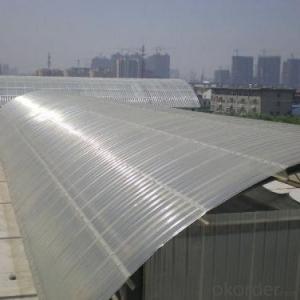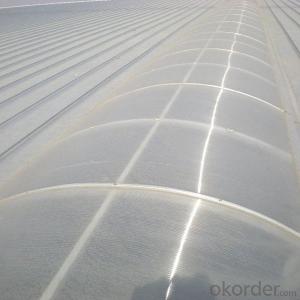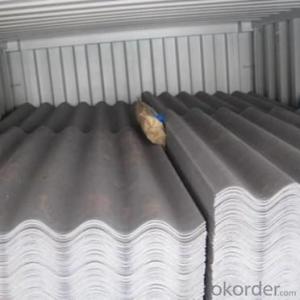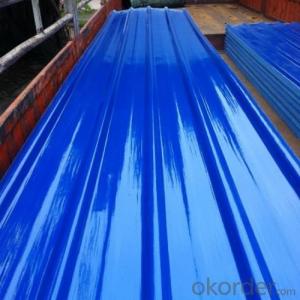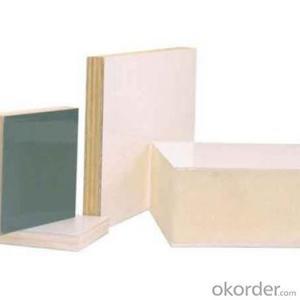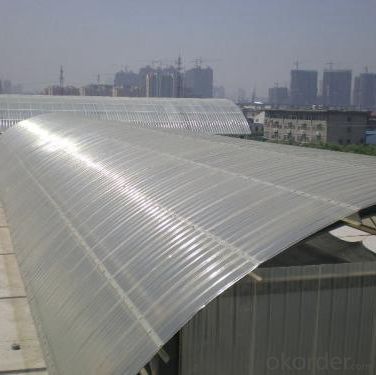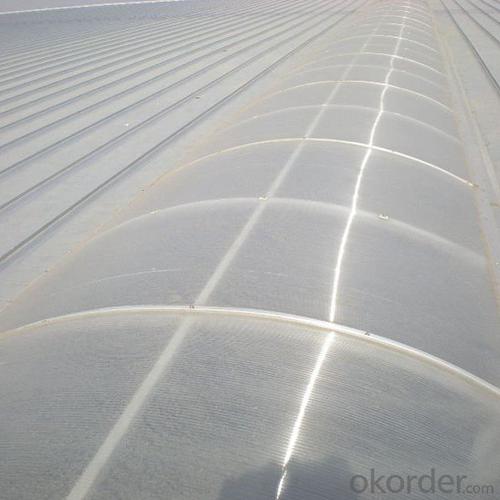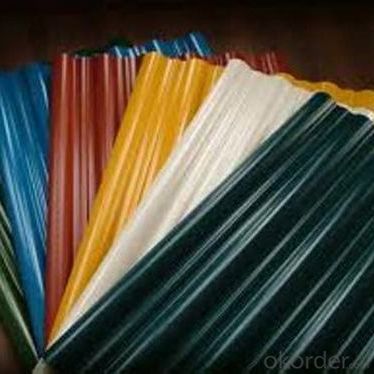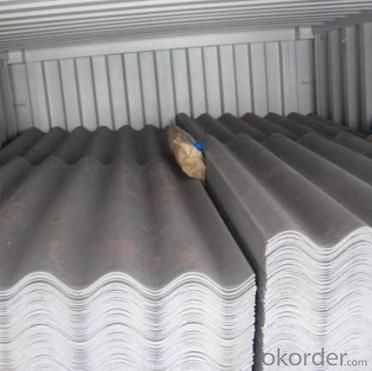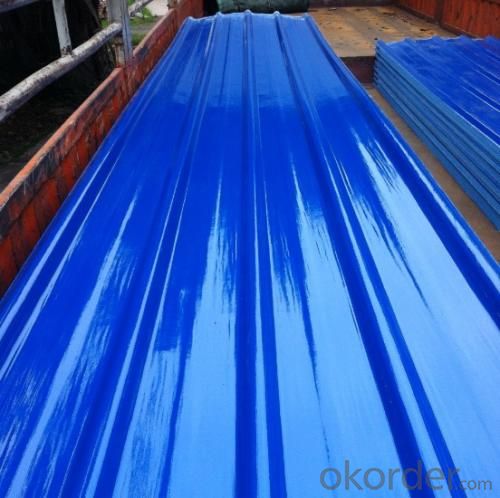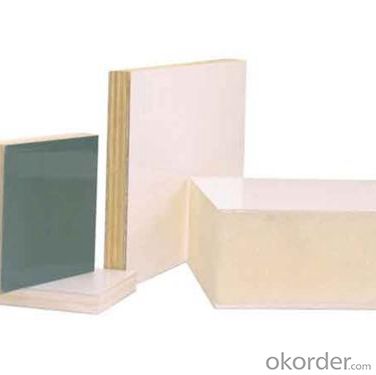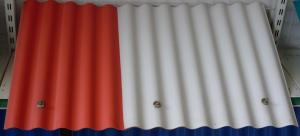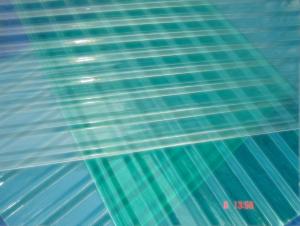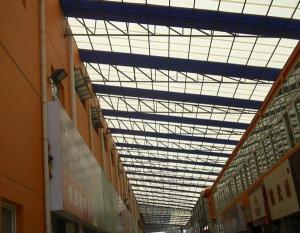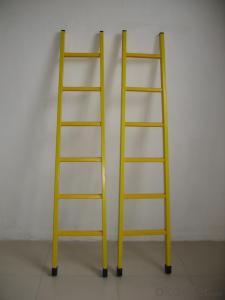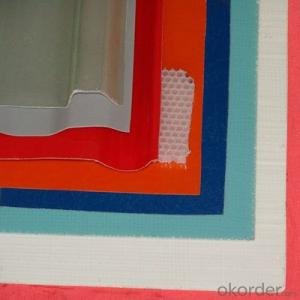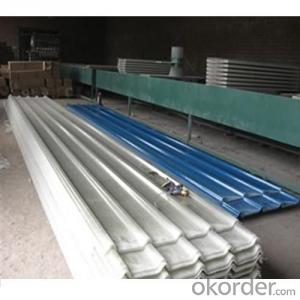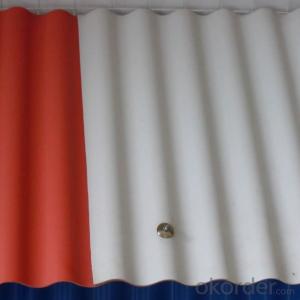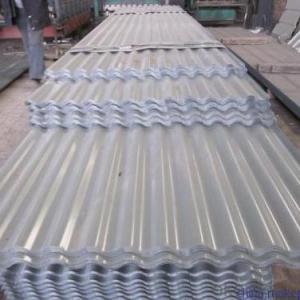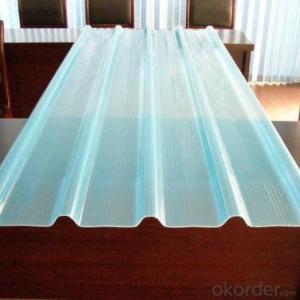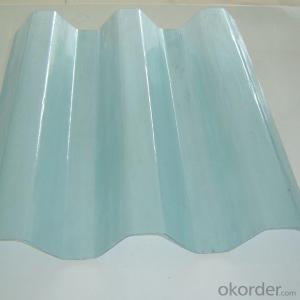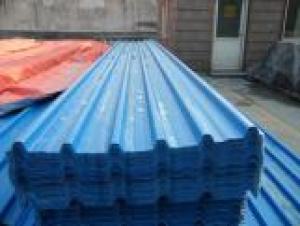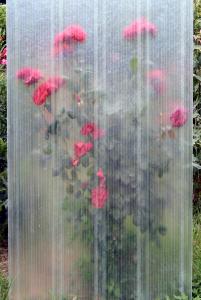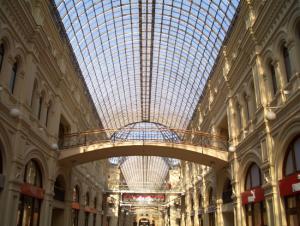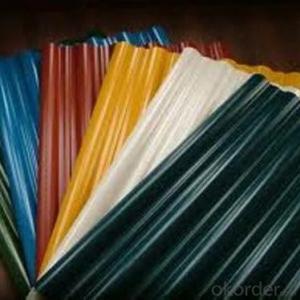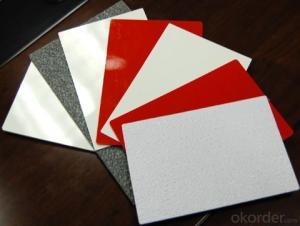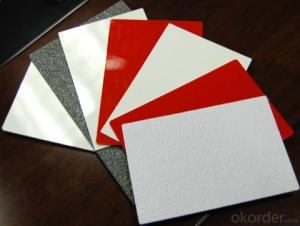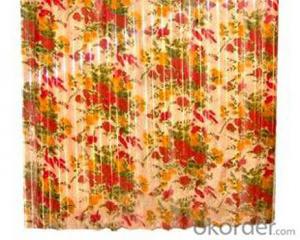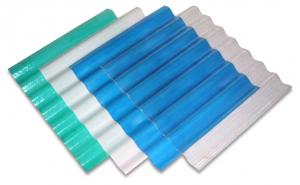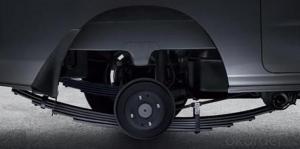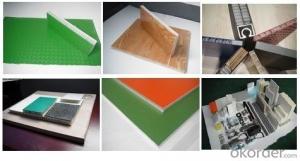Corrugated FRP GRP Roof Sheet for Roofing
- Loading Port:
- Tianjin
- Payment Terms:
- TT OR LC
- Min Order Qty:
- 400 m
- Supply Capability:
- 50000 m/month
OKorder Service Pledge
OKorder Financial Service
You Might Also Like
Specification
PRODUCT DESCRIPTION
FRP GRP Fiberglass Glassfiber Corrugated Roofing is a patent of our company, not like other FRP products, it is produced without yarn, instead, we use mat only. Therefore, the corrugated sheet is more strong in both horizontal and vertical direction.
Fiberglass corrugated sheet is usually used in construction site as protecting facility. It is dagarous for workers in building site since you never know if there is something hard drop down from the high area. So corrugated sheet is installed for preventing the stuff dropping down to hurt people.
Besides, it could also applied as the roof of the constructions.
FEATURES
1). Light Transmission: The light transmission of FRP roof sheet is between 3%-85%. Light through FRP corrugated sheet scatters and is mild. It will not form a light so as to make the indoor brighter.
2). Weather resistant: The UV agent mixing in the corrugated sheet, which can truly resist the damage of ultraviolet ray, which can truly resist the damage of ultraviolet ray.
3). Flame retardant: B1 grade.
4). Anti-corrosion: It resists chemical corrosion and its life span is over 3 times longer than zinc panel.
5). Water proof:100% water proof.
6). Impact capacity: resist impact, tensile and hardly breakable.
7). Light weight: the weight is light, etc
SPECIFICATION
| Fiber | E-glass chopped strand mat |
| Resin | Unsaturated polyester |
| Fiber content | 31.50% |
| Thickness | 1.2/ 1.5/ 2.0mm(±10%) |
| Transparent Rate | 30%-90% |
| Length | No limit |
| Gel coating | 150um |
| Warranty | 15/ 25years |
PICTURES
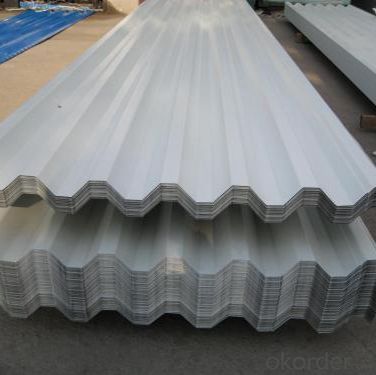
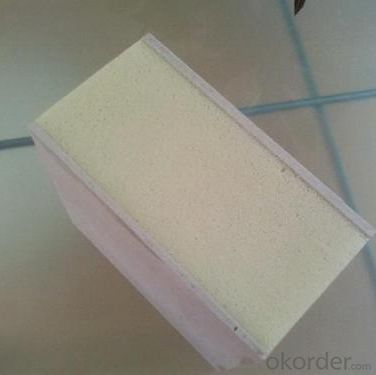
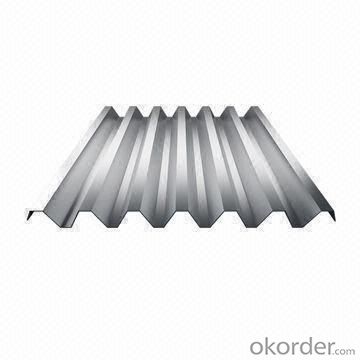
- Q: Are FRP roofing panels prone to warping from heavy machinery?
- Yes, FRP roofing panels are prone to warping from heavy machinery. The weight and vibrations produced by heavy machinery can put significant stress on the panels, causing them to warp over time. It is important to consider the load-bearing capacity and installation guidelines of FRP roofing panels to minimize the risk of warping in such scenarios.
- Q: Can FRP roofing panels be used for covered outdoor seating areas in restaurants or cafes?
- Covered outdoor seating areas in restaurants or cafes can indeed utilize FRP roofing panels. These panels, made of Fiberglass Reinforced Plastic, are exceptionally tough, resistant to harsh weather conditions, and capable of enduring outdoor elements. They provide superb shielding against UV rays, rain, and wind, making them an excellent selection for covering outdoor seating areas. Moreover, FRP panels are lightweight, easy to install, and demand minimal upkeep, making them a convenient alternative for restaurants or cafes. In addition, these roofing panels are available in a myriad of colors and designs, enabling businesses to fashion an aesthetically pleasing outdoor space that harmonizes with their brand identity. All in all, FRP roofing panels are a pragmatic and dependable choice for covered outdoor seating areas in restaurants or cafes.
- Q: Are FRP roofing panels resistant to snow and ice buildup?
- Yes, FRP (Fiberglass Reinforced Plastic) roofing panels are generally resistant to snow and ice buildup. The smooth surface of FRP panels reduces the chances of snow and ice accumulation, making them less likely to cause structural damage or leaks. However, it is important to note that the exact resistance may vary depending on the specific design, installation, and maintenance of the panels.
- Q: Can FRP roofing panels be installed over existing roofs?
- In certain cases, it is feasible to install FRP roofing panels over pre-existing roofs. However, there are several factors that need careful consideration prior to proceeding with the installation. First and foremost, the condition of the current roof must be evaluated. If the roof is extensively damaged or has structural problems, it may not be suitable for the installation of FRP panels. It is advisable to engage the services of a professional roofer to conduct a thorough inspection and determine the roof's suitability for the installation. Secondly, the weight of the FRP panels should be taken into account. If the existing roof is incapable of supporting the additional weight, it could result in further damage or even collapse. Once again, it is essential to consult with a professional to assess the load-bearing capacity of the current roof. Furthermore, it is imperative to check the compatibility of the FRP panels with the existing roof. Different roofing materials may have varying rates of expansion and contraction, which could cause problems if the panels are not installed correctly or if they do not align properly with the existing roof structure. Lastly, local building codes and regulations must be considered. Certain jurisdictions may have specific requirements or limitations when it comes to installing new roofing materials over existing roofs. Complying with these regulations is crucial to ensure the safety and integrity of the roof. In conclusion, while the installation of FRP roofing panels over existing roofs is possible, it is vital to assess the condition of the current roof, evaluate its weight-bearing capacity, check compatibility, and adhere to local regulations. Seeking the guidance of a professional roofer is highly recommended to achieve a successful and secure installation.
- Q: Can FRP roofing panels be installed on greenhouses or botanical gardens?
- FRP roofing panels are capable of being installed in both greenhouses and botanical gardens. These panels possess numerous advantageous characteristics, including their lightweight composition, durability, and exceptional thermal insulation capabilities. Consequently, they prove to be an optimal choice for such structures. Furthermore, FRP panels exhibit resistance to UV radiation, chemicals, and moisture, all of which are commonly encountered within greenhouse and botanical garden settings. This resistance enables the panels to effectively shield plants from the elements while simultaneously facilitating the transmission of ample natural light. By incorporating FRP roofing panels, one can achieve a cost-effective, long-lasting, and visually appealing solution for maintaining a controlled environment conducive to plant growth in greenhouses or botanical gardens.
- Q: Can FRP roofing panels be used in gymnasiums or sports complexes?
- Yes, FRP roofing panels can be used in gymnasiums or sports complexes. FRP (Fiberglass Reinforced Plastic) panels are lightweight, durable, and have excellent resistance to moisture, chemicals, and impact. These qualities make them suitable for high-traffic areas like gymnasiums and sports complexes where durability and low maintenance are essential. Additionally, FRP panels offer excellent light transmission, allowing for natural daylighting, which is beneficial for indoor sports activities.
- Q: Are FRP roofing panels prone to condensation or moisture buildup?
- FRP roofing panels are generally not prone to condensation or moisture buildup. Due to their excellent thermal insulation properties, they minimize the formation of condensation by maintaining a consistent temperature. Additionally, FRP panels are designed to be water-resistant and have good ventilation, preventing moisture buildup. However, proper installation and maintenance are crucial to ensure optimal performance and minimize the risk of any potential condensation or moisture-related issues.
- Q: Can FRP roofing panels be used in skylights?
- Yes, FRP (Fiberglass Reinforced Plastic) roofing panels can be used in skylights. FRP panels are lightweight, durable, and resistant to UV rays, making them suitable for skylight applications. They provide excellent light transmission, insulation, and can be custom-made to fit various skylight sizes and shapes.
- Q: Do FRP roofing panels require a specific type of adhesive for installation?
- Yes, FRP roofing panels typically require a specific type of adhesive for installation. The adhesive used should be compatible with the specific type of FRP panel being installed and should provide strong bonding properties to ensure secure and long-lasting installation.
- Q: Are FRP roofing panels suitable for parking garages or carports?
- Yes, FRP (Fiberglass Reinforced Plastic) roofing panels are suitable for parking garages or carports. They are lightweight, durable, and resistant to corrosion, making them ideal for use in outdoor structures. Additionally, FRP panels offer excellent UV protection, insulation, and are relatively easy to install and maintain, making them a practical choice for these applications.
Send your message to us
Corrugated FRP GRP Roof Sheet for Roofing
- Loading Port:
- Tianjin
- Payment Terms:
- TT OR LC
- Min Order Qty:
- 400 m
- Supply Capability:
- 50000 m/month
OKorder Service Pledge
OKorder Financial Service
Similar products
Hot products
Hot Searches
Related keywords
